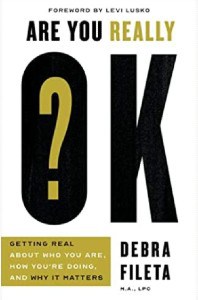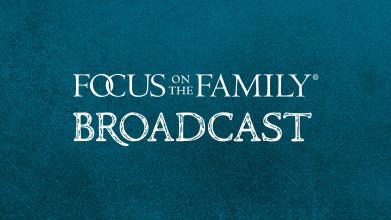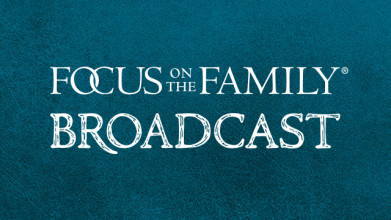Preview:
Debra Fileta: When you change your thoughts, you begin to change your life. And that’s why something that people are so passive about, what’s on replay, they don’t even think twice about it. We’ve gotta work to take inventory of our thoughts. Uh, the Bible says, “Take every thought captive.” In counseling, we call that cognitive behavioral therapy, you know. But God thought of it long ago, transforming our mind and making sure that what’s flowing out of our mind is bringing us health and not the other way around.
End of Preview
John Fuller: Debra Fileta is our guest on today’s best of 2021 Focus on the Family with Jim Daly. Thanks for joining us, I’m John Fuller.
Jim Daly: You know, life can be pretty stressful. Uh, I think we can all attest to that, between work relationships and other obligations. Uh, the pressure builds, and we lose sight of who we are and what we’re about. Um, it’s, you know, nipping at us all the time. But the last year or so has, uh, shown us that it’s more important than ever to take care of ourselves, including our emotional and physical health. God wants us to do that. Uh, 1 Peter 5:7 tells us, “We can cast all our anxieties on him because he cares for us.” And that’s a great promise. Uh, do we believe it, is a question. Here at Focus on the Family, we wanna help you, uh, bring healing and restoration to you and to your family with trusted Christian perspectives, um, and, uh, bring you, hopefully, that emotional, mental, physical, and most importantly, spiritual health-
John: Mm-hmm.
Jim: … that will keep you in a good place throughout your entire life. And we’re gonna do that today.
John: Yeah. And our guest, as I said, is Debra Fileta, and, uh, she’s a licensed professional counselor, uh, a national speaker, a relationship expert, a podcaster. She’s written a great book we’ll be discussing today, Are You Really OK? Getting Real About Who You Are, How You’re Doing, and Why It Matters. And we have that here at focusonthefamily.com/broadcast.
Jim: Debra, I think John missed the, uh, the most amazing part; mother of four.
Debra: (Laughs).
Jim: (Laughing) I love that one the most (laughs).
Debra: Yep. We just welcomed our fourth child three months ago.
Jim: Three months. Three months, I love it. And you’re actually sleeping through the night (laughs).
Debra: We are, praise the Lord. That, talk about helping with emotional health-
John: (Laughs).
Jim: (Laughs).
Debra: … when you sleep through the night.
John: Sleep is wonderful.
Jim: Well, and you know what’s so good about that is that’s wonderful for moms to hear.
Debra: Yeah.
Jim: I mean, you’re a professional mom. You’ve got the kids; you’ve just had a child. Uh, you’re living the dream (laughing) even though you may not get enough sleep to be dreaming.
Debra: Yeah. It makes all the difference.
Jim: (Laughs).
Debra: We shouldn’t be surprised when those small physical things like a lack of sleep actually begin to impact the other areas of our life as well.
Jim: Yeah. And you know, to get serious about it, you are a professional counselor. That’s your main thing. And your husband John’s a physician. And you, uh, probably individually, obviously, but as a couple too, I mean, you know a lot of people dealing with emotional, spiritual, mental health issues, et cetera. And even though a lot of us put our best foot forward, um, the reality is in our hearts, we’re really not always okay, which is the whole point of your book Are You Really Okay? What motivated you to write this? What were you seeing in the culture, in your own friendships, your own relationships that made you feel like, “Eh, maybe we’re putting a mask on?”
Debra: You know, th- I would say this book was motivated by two different things. First and foremost, the things I was seeing as a licensed counselor in my practice. You know, I’m working with amazing men and women who are spiritually mature, but not emotionally healthy, and not mentally healthy. I’m working with pastors who are struggling with burnout or anxiety or depression and things that we’re not always comfortable sharing about. But the problem is then the stigma grows and then we’re afraid to share about it when we’re struggling emotionally and mentally. And secondly, I’ve been through my own journey of mental and emotional health. I have battled depression and anxiety. Being a licensed counselor doesn’t make you immune to those things. And so, because of those two reasons, I’m just very passionate about this important message.
Jim: In fact, um, to kind of pull the audience in so they can hear your heart, you had one of those full-blown panic attacks. Uh, for people that have not had that experience, I have not had that experience, describe for me and for the listeners, what is that like? And what was your particular circumstance? What happened and how did it grab you in that way?
Debra: A panic attack is essentially a physical manifestation of emotional distress. So, you’ve got all of these underlying emotions, but they come out through the form of a physical manifestation. So, you might feel dizziness, lightheaded. You might feel like your heart rate is skyrocketing. You might even feel tingling or sweating, an inability to breathe. And many people really believe that something is happening physically. A lot of my clients describe it as going crazy, or they feel like they’re gonna die. And usually, you run to the emergency room only to find out that there’s nothing wrong with you physically, and it’s an emotional response what’s actually affecting your physical health.
Jim: What happened in your case though? You were traveling somewhere-
Debra: Yeah.
Jim: … or about to go on a field trip or something?
Debra: So, a few years back, I actually went through a very traumatic miscarriage where I lost the baby, but I also almost lost my life. I started hemorrhaging and it was a very traumatic experience. But the thing about trauma is it doesn’t always affect you in the moment. Usually in the moment you’re in survival mode and you don’t have time to face the trauma. Well, about two years after that, I was in a safari park with my kids and my husband and all of a sudden, I started having these symptoms that I would describe as a panic attack. But what I didn’t realize was that my body was now starting to process the stress that I had gone through many years before but never really taken the time to face-
Jim: Uh.
Debra: … and deal with and heal.
Jim: That’s amazing though, two years later.
Debra: Two years later. I mean, if you think about it, when soldiers go off to war-
Jim: Right.
Debra: … they’re in the middle of a battlefield. They are not there to process the trauma. It’s when they get home and they’re not in survival mode anymore, when things have calmed-
Jim: Mm-hmm.
Debra: … down, oftentimes that’s when trauma begins to impact you.
Jim: Let me ask you spiritually, uh, from a Christian perspective, w- what is God doing in the make-up of his creation? Why do we go through that? What is the helpful aspect of it and what’s the thing that we have to look out for?
Debra: Well, I think by design, it’s a beautiful process because it shows you that God understands how human being’s work. He knows that when we’re in survival mode and we’re dealing with the stress of what’s going on today, we don’t have the capacity to also process it in a healthy way. So, he allows us to sort of hibernate in a good way. And then later on, he brings it to us when we’re ready to heal. Uh, layer by layer healing happens. I think if it all happened at once, it would be quite overwhelming. And not only that, I don’t think many of us would be able to survive through it.
Jim: Yeah. In the book of Mark, y- you point to w- w- something, I think you call the baseline for general health.
Debra: Yeah.
Jim: It corresponds with the greatest commandment. Describe that scripture in Mark that caught your attention as a counselor-
Debra: Mm-hmm.
Jim: … that helps people.
Debra: Uh, you know, I think the most important thing to remember as we talk about this scripture is just because we’re Christians doesn’t mean we’re healthy. And Jesus calls us to love him with our heart, soul, mind, and strength. That’s what we read in scripture. When we look at that, heart represents our emotional health, soul represents our spiritual health, mind represents our mental health, strength represents our physical health. So, we shouldn’t be surprised when we face struggles in those areas because if we’re to love God with our heart, soul, mind, and strength, you better believe the enemy is going to try and attack us in our heart, soul, mind, and strength. So instead of being surprised by the struggle, as Christians, we just need to be prepared for.
John: Hmm.
Jim: And you know, the reality is we are in this world. I mean, scripture tells us we’re in this world. Paul told us we’re gonna struggle in this world. Uh, we’re wired spiritually, particularly, for life eternal with Christ in heaven. But in that context, uh, Christians who do struggle with anxiety, with depression, uh, that’s part of my wife’s story. She’s been on the broadcast before. Her family has really struggled in those areas. Biochemically, I mean. Um, how do we in the Christian community communicate positiveness about the idea of seeking help? Don’t hold back. It’s okay. I think my wife would say, Jean would say, she struggled with the concept that, “If I’m a believer in Jesus, then I should pray that he takes this away.” But that can be traumatic over a decade or two. And you’re not getting help in that regard. So, speak to those anxieties-
Debra: Yeah.
Jim: … and what Christians should do.
Debra: You know, those are truly unhealthy beliefs that hold us back from healing. I remember once when I was in the presence of a pastor, I had just come out of a dark postpartum depression, and he didn’t know that. And he said, “True believers don’t suffer from depression because they have the Holy Spirit at work in them.” And I was devastated to hear that. He didn’t know what I had just come through.
Jim: And what did that make you feel like? ‘Cause, uh, Jean and I have talked about this specifically, less than.
Debra: Yeah.
Jim: Like, I’m not, I’m not good for God.
Debra: Right. It makes you feel like you don’t have enough faith, or you don’t have enough strength or maybe there’s sin in your life. Rather than seeing it as a chemistry issue, we see it as a character issue. And that’s flawed thinking, because many times what’s actually happening underneath the surface is a chemical imbalance, um, that could be caused by many different things, whether it be past trauma, whether it be hormonal imbalance. There’s a plethora of things it can be caused by, but we have to understand that we can’t just point to it being a faith issue and leave it at that.
Jim: And the idea that, you know, I w- I want to also acknowledge, there are spiritual things that occur around the world. I’ve seen things that, you know, you pray against, you pray for that person. So those are realities as well, spiritual bondage, et cetera. But so often in this area of mental health, it is exactly that, it’s chemical issues that are occurring in the physical nature-
Debra: Yeah.
Jim: … that were made up with.
Debra: Everything is holistic in the sense that when we’re faced with a problem mentally or physically, we do bring it to prayer. I think it would do us better to use the, the comparison of a cancer diagnosis. You know, when you’re diagnosed with cancer, first of all, you don’t blame yourself. You know, you don’t say, “Maybe I didn’t have enough faith or strength.” You, you look at the cancer and you say, “How am I gonna attack this?” You go get medication. You go get help. You go get whatever you need.
John: You get a lot of prayer partners (laughs).
Debra: And then the community supports you. They bring you meals, they lift you up in prayer. But we don’t always treat depression and anxiety, which is an illness of the mind and the brain, in the same way.
Jim: Yeah. And in Mark, uh, I think you’re pointing to the scriptures, “Hear O Israel, the Lord, our God, the Lord is one, and you shall love the Lord your God with all your heart, all your soul and with all your mind and with all your strength.”
Debra: Yeah.
Jim: And, and that’s what you’re reinforcing.
Debra: Yes.
Jim: And, uh, some people, especially those that are struggling with, uh, mental illness, that’s a daunting task, just hearing that. “Wow, I don’t know if I can accomplish that.” Speak to the inadeq- the feeling of inadequacy, that I can give that way to the Lord, uh, you know, with all my heart, with all my mind, with all my strength? Uh, do people come into your practice asking, “How can I do this, Debra?”
Debra: Yeah, I think it can seem overwhelming when we look at the blanket verse, “Love the Lord your God with all your heart, soul, mind, and strength.” And we have to remember, this is step by step, pro- little by little, one thing at a time where we’re trying to align who we are to who God has called us to be. This isn’t an overnight process of healing. We don’t overnight get to a place where we’re struggling, and we don’t overnight get to a place of healing. And so, I think we have to give ourselves grace and realize that healing in all of these areas is layer by layer. It’s a cyclical process. Two steps forward, a couple steps back, a few steps more forward, but we’re moving in the direction of sanctification.
Jim: Right? And that’s exactly the word I was gonna use. Life is the process of sanctification. And the Lord knows that.
Debra: Yeah.
Jim: He created it for us. And i- hopefully we’re growing closer to him, more deeply in him every day, until we die, and we’re with him. That’s the whole point. Uh, Debra, what’s a good way to survey how our past affects us? I know that’s something we look at. We’ve had many guests on the program talking about family of origin issues. Um, how much attention should we pay to that family of origin? The household we grew up in.
Debra: I think the best indicator of how the past is impacting us is what’s happening in the present.
Jim: Describe that.
Debra: When we find ourselves dealing with insurmountable emotional struggles, or relationship conflict that doesn’t seem to be going away, or maybe an inability to control our emotions, our anger, these are usually signs that there’s something that needs healing in our life. And oftentimes it’s something from our past that we haven’t identified. So, I call them these emotional black and blues that happen in the present. You know, when there’s a, a big reaction to something, maybe you feel like it’s an over-exaggerated response to a situation, oftentimes these emotional black and blues are sore spots from the past.
Jim: Hmm.
Debra: When somebody presses up on them in the present-
Jim: (Laughs).
Debra: … they hurt.
Jim: So true.
Debra: You know, they notify us that something’s going on in.
Jim: And in those emotional patterns then, uh, w- what are some of the patterns that you’ve noticed maybe in your own life?
Debra: I think oftentimes what happens is we learn from our past experience for the good and for the not so good. And many people listening might say, “Well, I had a pretty good childhood. You know, I didn’t, there wasn’t-”
Jim: “I felt loved.”
Debra: “I felt loved-”
John: Mm-hmm.
Debra: “Oh, I have Christian parents.”
Jim: Yeah.
Debra: Well, I come from that type of a background of good home, good family. They loved the Lord. My grandfather was an evangelist all across the Middle East. But there were patterns that I wasn’t aware of that I needed to deal with that were impacting my emotional health. For example, when you grow up in an immigrant family, you kind of learn that you need to do, you need to work hard. It’s almost like a productivity factor. And so, for me, I equated value with how much I was able to accomplish, because that’s what they did coming from a different country, starting new in America. Even though it was a Christian home and focused on ministry, I began translating that into my life as, “I need to do in order to be valued by God.” And when you get to a point of doing too much for the wrong reasons, you reach burnout, you’re empty, you’ve got nothing left to give. For me, I reached a place of depression.
John: Hmm.
Debra: And so even though it was a healthy family, there were still unhealthy patterns that were passed down to me that I needed to deal with.
John: Well, today we’re talking to Debra Fileta on Focus on the Family. And, uh, her book, Are You Really OK? Getting Real About Who You Are, How You’re Doing, and Why It Matters, a great resource. And we’ll encourage you to look for a copy at our website, focusonthefamily.com/broadcast, or call 800, the letter A, and the word FAMILY.
Jim: Uh, Debra, in the book, you use a couple of metaphors, one, the iceberg, and then the volcano. (Laughing) I think they are pretty self-evident.
John: Extremes here.
Jim: But, uh, describe what the iceberg represents and the volcano.
Debra: You know, the iceberg is kind of our tendency to really stay superficial. Uh, the reason I call this book Are You Really Okay is because it’s easy to answer that question and say, “Yeah, I’m good. You know, I’m fine,” without really going deeper. But just like an iceberg, there’s always more, a lot more going on underneath the surface. And I think this past year for so many people, 2020 was a year of dealing with a lot of emotions. I call it the year of exposure because emotions are like a volcano in the sense that there’s always pressure building underneath the surface. When you don’t identify those emotions and deal with them in a healthy way, they will find the point of least resistance-
Jim: Hmm.
Debra: … and you will experience an emotional explosion. For me, it was a panic attack. For you, it might be an anger outburst, or disconnecting from your spouse emotionally. Maybe you’re withdrawn and depressed. But that’s the key, is learning that to be emotionally healthy, we’ve gotta learn to go underneath the surface and figure out what’s really going on inside of us.
Jim: You know, and when you say it in that context, Debra, I would think that spouses are typically the recipient of the explosion.
Debra: Yeah, you’re absolutely right.
Jim: Right? Uh, it-
Debra: Many times, relationship conflict gives you a signal that there’s a lot more going on underneath in your personal life.
Jim: You know, one thing before we move to spiritual health and talk about that, uh, w- w- when you ask the question, “Are you really okay?” Sometimes I think people respond like, “Yeah, I’m fine,” because they kind of infer that you really don’t wanna know. This is a cultural gesture.
Debra: Yeah.
Jim: Speak to that as well. Are we really ready to hear somebody say, “Well, sit down, ’cause I’ve got a lot of baggage I gotta tell you about it.”?
Debra: You’re right, it is a cultural gesture. When you see somebody at the store, you’re not gonna unload.
Jim: (Laughing) yeah, right.
Debra: And if you do unload, you’re probably gonna be looked at like something’s wrong with you, right?
Jim: Yeah, the friend will avoid you in the future.
Debra: The problem is we take that cultural gesture, that thing that’s been normalized through social media, you know, on Instagram are only posting the highlights.
Jim: Oh, yeah.
Debra: We’re, we’re presenting this picture that we’re doing okay, so much to the point that we actually start believing that’s really all there is to us-
Jim: Yeah.
Debra: … and we don’t take the time to dig deep. And we don’t have people in our life who we can really open up with. That would be my question to you. “Do you have people in your life where you can honestly answer that question?” I’m not saying you need to answer it to everyone you run into in the store, or on Instagram or social media, but you need to have people in your life that you can really begin to take a little deeper and begin to unpack how you’re really doing.
Jim: That’s a great suggestion. And develop those friendships where you can have that. Two, three people-
Debra: Yeah.
Jim: …. is all it really takes to be able to be that vulnerable, that honest. Let’s move to the spiritual component and the spiritual wellbeing that we need to seek. W- w- what does that even look like? Uh, like emotional, I’m not sure that we know. Outside of going for annual physicals-
Debra: Right.
Jim: … I think I’m lost.
Debra: Well, first of all, let’s start with what it’s not. Spiritual health is not a checklist of things we’re doing right.
Jim: (Laughs).
Debra: It’s not, “I’m reading my Bible. I’m going to church. I’m praying every day.” You can do all those things and not be spiritually healthy. When my husband was in medical school, this guy off the street, snuck into the hospital and wore a white coat and pretended to be a doctor all day just for a prank. And it took all day for people to recognize that he was a fraud. He wasn’t really a doctor. Just because you wear a white coat doesn’t make you a doctor. Well, doctors wear white coats, but that’s not what makes you a doctor. And I think spiritual health is the same. Just because we go through our spiritual checklist doesn’t make us spiritually healthy. What makes us spiritually healthy is ultimately why and what our beliefs about God, why we’re doing the things we’re doing. What is motivating us and what is our view of God? And sometimes that view of God can be tainted. We’re doing things for God out of shame or fear or guilt rather than because God is love, unconditional, because of his kindness. And I think if our view of God is faulty, everything else is gonna be faulty that outflows from that.
John: Mm-hmm.
Jim: Wow, you may be describing all of the ills of Western civilization (laughing) at this point. That’s a big statement- you’ve just made. Um, Debra, you had an experience, I believe in a psych ward-
Debra: Yeah.
Jim: … when you were doing your counseling and you had to, uh, do your student hours or something like that.
Debra: Yeah.
Jim: What happened in that context? And what did you learn from it?
Debra: When I was first starting off as a counselor, I worked at a psychiatric unit and I was in charge of this young man who had psychosis, which he was hearing and seeing things. And I was doing an assessment to see how he was doing, and I was asking him these questions and I started twirling my earring with my finger. It’s kind of a nervous habit. Well, little did I know that he comes from an abuse history of a mother who used to also twirl her earrings.
Jim: Oh my.
Debra: And the second he saw me doing that, he transferred all of his feelings onto me. He started screaming at me, “You ruined my life. I hate you.” The, with, in counseling, we call that transference, where you put all of your hurts on an innocent bystander. Sometimes we do the same thing to God because of our past wounds, things we’ve experienced in our family, maybe an absent father or a critical mother. We tend to then see God through that same lens. We transfer those hurts onto him, and we see him with flawed eyes. And honestly, I think that’s the number one thing that inhibits our spiritual health.
Jim: It, let me dig into that for a moment, because it’s one of the most difficult questions that I’ll get, you know, when I speak and I talk about m- you know, my testimony is basically, you know, as an orphan child. But men will come up to me particularly and they’ll say, “How did you not become bitter towards your alcoholic father?” It’s one of the most difficult questions for me to answer because I never did. And I think in that context for me, I, I had a healthy, even as a child, I had a kind of a healthy understanding. This was his problem, not my problem, yet I wanna be tender to those 50 men that are standing in that line and basically saying the same thing to me. They’re 40, 50, 60 years old and they’re asking me, “I’m still bitter at my dad for what he did to me.” How do you help that person to say, “You gotta let go? I mean, what your father did to you, your father owns, you do not own this.”
Debra: Right? I think when we, when it comes to dealing with these difficult experiences, it’s important to acknowledge how we feel, you know, not to try to sugarcoat it, not… I love that you had such a healthy reaction, but I’m also aware, like you said, not everybody does.
Jim: Hmm.
Debra: And that’s okay. That’s a starting point-
Jim: Right?
Debra: … right? To be able to say, “I do feel bitter. I do feel hurt.”
Jim: And it’s okay to do that-
Debra: It is okay-
Jim: … to feel that.
Debra: … because as you’re acknowledging that, what you’re doing is you’re starting to diffuse those underlying emotions underneath the surface of that volcano. You’re acknowledging them. You’re putting words to them. And I think for some people, through the process of things like counseling, you begin developing empathy for the people that hurt you and seeing that hurt people end up hurting people. Right? We, we hear that phrase often-
Jim: Right.
Debra: … but when you start having empathy and compassion and seeing where that hurt person came from, you begin freeing yourself from the pain that you carry. It’s a process. You know, it’s not something that overnight. And I really believe that even when you forgive somebody, the process of forgetting can take time and energy and work. And you might never forget-
Jim: Yeah.
Debra: … but you’re at least able to put that on them and take ownership of what is on you.
Jim: What about that person who maybe has carried that burden for decades and th- they get it out there, “I do have this bitterness. I acknowledge that.” They may have had that discussion with the Lord, you know, kind of the shaking fist, “God, why have you done this to me?” And they’re still in that part of the cycle. They haven’t really made it to the letting go. What encouragement do you have for them s- for them to say, “Yeah, I’m okay?” I mean, they’re really moving from, “I’m not okay,” to, “I’m okay.”
Debra: I just would remind them that healing happens in layers and not to expect themselves to get to a, a wonderful place overnight. When you think about past abuse and how many days it takes for you to experience, or how many years you’ve been through that type of thing, to have the expectation on yourself that you’re gonna heal from that overnight is unrealistic.
Jim: Right.
Debra: You’re putting too much pressure on yourself. If it takes years to get to a place of bitterness, it might take years to unpack that.
Jim: Yeah.
Debra: It might take months to unpack some of those things.
Jim: Yeah.
Debra: And it’s a process. It’s a journey. It’s l- again, it’s a journey of sanctification and you’re not alone through it. Uh, when I think about blame, it tends to happen in three ways. First, we put the blame on ourself.
Jim: Mm-hmm.
Debra: “I did something wrong.” The next level is we put the blame on God, “He did something wrong.” But I think the third place where we should land is putting the blame outward on this world, this sinful, fallen, broken world, and the enemy that lurks within. When we can leave the blame there, we can begin to move away from it and begin to heal.
John: That’s Debra Fileta on this Best of 2021 Focus on the Family broadcast, bringing a message of hope and healing. And I do trust that you’ve been encouraged by what she had to share today.
Jim: Debra is outstanding at communicating what the overall picture of health looks like. She’s so compassionate toward people who are hurting and here Focus on the Family, we feel that way, too. That’s why we have a team of caring Christian counselors right here on staff. You can set up a consultation with one of them. They will listen to your specific situation, pray with you, and provide a path forward. It may include some resources or a referral to a counselor in your area,
John: And the initial consultation with our counselors is free. We know that Christmas can be a really tough time for couples who are really fractured in their relationship and families who are experiencing a crisis, and parents who don’t know what to do about their child or mothers who are considering abortion. So please get in touch today.
Jim: It’s also the time for us to share the hope, healing, peace, and grace, and joy that Jesus Christ came to give each one of us. This Christmas, you can come alongside those who are struggling and give families hope through your support of Focus on the Family. And when you donate today, a gift of any amount, we’ll send you a copy of Debra’s book Are You Really OK? Getting Real About Who You Are, How You’re Doing, and Why It Matters, as our way of saying thank you. And now, through a special year in matching opportunity, your gift will be doubled dollar for dollar. God will use your gift to bring healing and redemption to twice the number of families. So, on behalf of those families that you’re going to be reaching and helping through Focus on the Family, let me say thank you.
John: Donate today and get your copy of the book by our guest. Are You Really OK? We’ve got all the details online at focusonthefamily.com/broadcast or give us a call 800, the letter A, and the word FAMILY. 800-232-6459. Well plan to be with us next time as we continue the conversation with Debra Fileta. For now, on behalf of Jim Daly and the entire team, I’m John Fuller inviting you back as we once more help you and your family thrive in Christ.

























